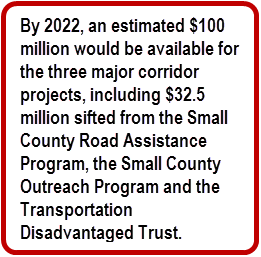Florida Senate Turnpike Building Bill Gains House On-Ramp: Small County Road Funding to Take Hit
Posted March 30, 2019 11:15 am

TALLAHASSEE – There was some question when - and, in some quarters, if - the House would pick up Senate President Bill Galvano’s top priority to launch a decade-long, multi-billion dollar plan to build three toll roads.
Would the House divvy up proposals within Galvano’s Multi-Use Corridors of Regional Economic Significance (M-CORES) Program, opting to partially fund two, one, or none at all?
 Was
Senate Bill 7068, the M-CORES package that
is just one committee nod from a Senate
floor vote, being “delayed” in its House
introduction until leaders saw movement on
favored legislation in the Senate?
Was
Senate Bill 7068, the M-CORES package that
is just one committee nod from a Senate
floor vote, being “delayed” in its House
introduction until leaders saw movement on
favored legislation in the Senate?
That speculation ended this week when PCB TTA 19-02 appeared on the House Transportation & Tourism Appropriations Subcommittee’s agenda Thursday and was subsequently approved in a 9-3 vote.
 PCB TTA 19-02 replicates SB 7068 in
creating the comprehensive M-CORES program,
an ambitious plan to build the proposed
150-mile Heartland Parkway from Polk County
to the Naples area, extend Suncoast Parkway
about 150 miles north from Chassahowitzka to
the Georgia state line and extend the
Florida Turnpike about 40 miles west from
I-75 to Suncoast Parkway.
PCB TTA 19-02 replicates SB 7068 in
creating the comprehensive M-CORES program,
an ambitious plan to build the proposed
150-mile Heartland Parkway from Polk County
to the Naples area, extend Suncoast Parkway
about 150 miles north from Chassahowitzka to
the Georgia state line and extend the
Florida Turnpike about 40 miles west from
I-75 to Suncoast Parkway.
M-CORES would be funded through annual license plate tag revenues shifted into the State Transportation Trust Fund (STTF) from the state’s general fund and several other state Department of Transportation funds.
Like SB 7068, PCB TTA 19-02 - which had not been issued a bill number and assigned committee reviews by Thursday evening - calls for $45 million in Fiscal Year 2020 and $90 million in 2021 and then $135 million annually through 2030, totaling more than $1.3 billion, to finance a state turnpike bond to pay for the bulk of the project.
By 2022, an estimated $100 million would be available for the three major corridor projects, including $32.5 million sifted from the Small County Road Assistance Program, the Small County Outreach Program and the Transportation Disadvantaged Trust.
According to a 24-page analysis of the 21-page bill, state law requires no more than $10 billion in bonds be outstanding to fund turnpike projects. As of June 30, 2018, the Florida Turnpike Enterprise (FTE), which manages the state’s eight turnpike systems, had $2.6 billion in outstanding bonds and its five-year capital plan includes $1.5 billion in additional bonds.
Construction would begin in 2022 and end by Dec. 31, 2030.
As they have in previous Senate hearings on M-CORES, representatives of the Sierra Club and Florida Conservation Voters testified against the proposal Thursday before the House panel.
The road-building projects would “fragment landscapes” and imperil the fragile Florida Aquifer, Sierra Club’s David Cullen said.
“It will chew through Florida’s remaining undeveloped lands in search of alleviation of congestion,” Cullen said. “But there is no congestion where these corridor projects are proposed.”
Environmental Caucus of Florida’s Amy Datz said her organization supports M-CORES because it will reduce air pollution by pulling cars off U.S. 19, where they often idle in traffic.
Rep. Matt Willhite, D- Wellington, one of three Democrats to vote against the bill, expressed reservations about diverting money - up to $1.3 billion over a decade - from the state’s general fund to build toll roads.
“We’re already starting immediately next year to start moving money out of’ general revenues, he said, noting the $45 million earmarked for the first year is to just fund a study.
“I don’t think we need that much money to create a commission to do a study,” Willhite said. What Galvano really wants, he added, is a “nest egg” for pet infrastructure projects.
If the Senate President wants a “nest egg” for infrastructure, that’s fine with him, said Committee Chair Rep. Jay Trumbull, R-Panama City.
“This would be potentially viewed as a nest egg,” Trumbull said. “We’re programming money for these projects obviously, depending on what comes out of these task forces.”
Rep. Joseph Geller, D-Aventura, said he supported the bill because, ultimately, the fine print within the M-CORES program will be produced by studies and then determined by local people in regional task forces.
“These might be the three worst ideas we’ve ever heard,” Geller said. “They might be totally terrible roadways - I don’t know and I don’t think any of us really know until somebody studies it.”
In a statement, Galvano cheered the proposed M-CORES program’s introduction into the House’s legislative ecosystem.
“I am pleased to see the issue moving in the House and look forward to working with Speaker Oliva and the Florida House on important issues related to infrastructure as we move forward,” Galvano said.
-------------------------------
This piece appeared in the Watchdog.org and was reprinted by the Columbia County Observer with permission or license.
Layout and graphic added by the Observer; graphic by Suncoast

 By
John Haughey
By
John Haughey